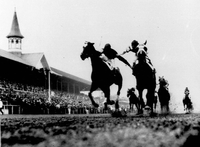In Horse Racing, what is the difference between a firm, soft, and yielding track condition.?
2008/01/29 13:04 / Horse Racing/TheoryIn Horse Racing, what is the difference between a firm, soft, and yielding track condition.?
Does it change the speed of the horse, and by how much in each case?
What is Yielding? What does it mean?
What is Yielding? What does it mean?
Best Answer - Chosen by Asker
Yielding is an Irish description of going: it is what we would call heavy ground here in GB.
Basically good ground is genuine ground with a bit of spring in it that most horses should run well on.
Firm ground is ground that has dried out and is therefore firmer to run on. You will find horses run faster on firm ground as there is no give in the ground to slow the speed. However, horses can get injured on firm ground as there is no absorbtion of the shock of the horses foot hitting the ground. If you hear a commentator or trainer say a horse "likes to hear his hooves rattle" they mean the horse runs best on firm ground.
Soft ground has slightly more give in it than good ground, but is still considered safe for most horses to run on.
Yielding/heavy ground is very stamina sapping and therefore will slow horses down considerably. Try to imagine yourself running through a muddy field: your feet are being sucked into the mud and you use up a lot of energy.
I'm not sure about how much (in terms of mph) the ground slows or speeds up a horse but having looked at the last 18 runnings of the 2,000 Guineas (over 1 mile) the fastest running was in 1994 by Mister Baileys in 1.35.08 on Good to Firm ground. The slowest was in 1998 by King of Kings in 1.39.25 on Good to Soft going.
Hope that helps.
Basically good ground is genuine ground with a bit of spring in it that most horses should run well on.
Firm ground is ground that has dried out and is therefore firmer to run on. You will find horses run faster on firm ground as there is no give in the ground to slow the speed. However, horses can get injured on firm ground as there is no absorbtion of the shock of the horses foot hitting the ground. If you hear a commentator or trainer say a horse "likes to hear his hooves rattle" they mean the horse runs best on firm ground.
Soft ground has slightly more give in it than good ground, but is still considered safe for most horses to run on.
Yielding/heavy ground is very stamina sapping and therefore will slow horses down considerably. Try to imagine yourself running through a muddy field: your feet are being sucked into the mud and you use up a lot of energy.
I'm not sure about how much (in terms of mph) the ground slows or speeds up a horse but having looked at the last 18 runnings of the 2,000 Guineas (over 1 mile) the fastest running was in 1994 by Mister Baileys in 1.35.08 on Good to Firm ground. The slowest was in 1998 by King of Kings in 1.39.25 on Good to Soft going.
Hope that helps.
There are currently no comments for this question.
* You must be logged into Answers to add comments. Sign in or Register.
Other Answers (3)
-
I think that the different going descriptions with moisture are as follows; good, yielding, soft, (holding), heavy. Yielding means that the ground yields to the pressure of hooves. For instance the official going at Listowel recently on September 23 was described as good to yielding, so I hardly think that yielding is equivalent to heavy as that would amount to nonsense.
-
its about turf tracks,its basicly the heigth of the grass
Source(s):
my name is track daddy -
OK,to start with the different descriptions of the track indicate how much water there is in the ground,with firm less water than yielding.The speed of the horse is governed by the action(way it moves) of that horse.Horses that like yielding ground tend to have a high knee action and can get their feet out of the sticky conditions easier than a low actioned(daisy cutting) horse who skims across the surface.this type is usually suited to fast ground conditions.the range of going descriptions are ..Hard,Firm,Good to Firm,Good,Good to Soft,Soft,Yeilding(irish term meaning soft)and Heavy.After heavy the course is unraceable.
Source(s):
pro.trainer for over 25 years in the uk.
TAGS 경마
Trackback URL : 이 글에는 트랙백을 보낼 수 없습니다
Trackback RSS : http://www.fallight.com/rss/trackback/1326
Trackback ATOM : http://www.fallight.com/atom/trackback/1326








